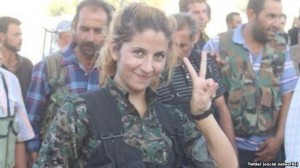This week, my two posts were about the PKK’s status as a terrorist group and whether its claims of gender equality are actually factual. My first post is an article published in The New Republic, an American left-leaning political magazine, in which the author, French philosopher Bernard Henri-Levy, argues that the PKK should no longer be considered a terrorist organization. He cites four “factors” as evidence. First, that though the PKK committed terrorist acts in the ’70s and ’80s, the organization renounced violence in 1999, and secondly, that it has transformed since then into an entity that advocates for the Kurdish State with “dialogue and confederation”. Henri-Levy also claims that the PKK should not be considered a terrorist group because they have acted so effectively in the coalition against the Islamic State. Lastly, he argues that the organizations Marxist-Leninist roots have made it a strong supporter of moderate Islam, secularism, and gender equality, and that in order to support the spread of those ideals in the Middle East, Western powers should support the PKK. I would disagree that the PKK has renounced violence: in 2004, the group returned to guerrilla tactics and attacks in southern Turkey became frequent. Henri-Levy seems to take the political liberalist’s approach, arguing that the PKK is necessary to the multilateral coalition to defeat the Islamic State.
My second diigo post is partly a news report and partly a discussion of gender equality in the PKK. On October 27, rumors began to spread on social media that a Kurdish female fighter known by the pseudonym Rehana may have been beheaded by Islamic State militants in Kobani. Rehana became the face of the PKK’s female fighters after a photo (pictured above) of her making the victory sign was retweeted hundreds of times on Twitter. An image of a beheaded woman whom IS fighters claim to be Rehana was posted on pro-IS social media sites on the 27th, but it is impossible to verify whether the photo is genuine. The author goes on to discuss the complicated history of gender equality in the PKK. Currently, the group has the largest female militia in the world, and has a history of feminism rooted in it’s founder Abdullah Ocalan’s ideology. However, the author cites claims made by Berfu Kiziltan about how while the PKK has historically recruited women as well as men, in its early days, recruitment was sometimes by force. The author also mentions the PKK’s history of female suicide bombers, as well as a recent suicide bombing in Kobani carried out by a female PKK soldier. The author remains unbiased in her discussion of the PKK and gender equality, so it is difficult to determine which perspective on globalization she has. If anything, I would say that she is also a political liberal, because she seems to value the contributions of the PKK in the anti-IS coalition, as part of a multilateral approach.
